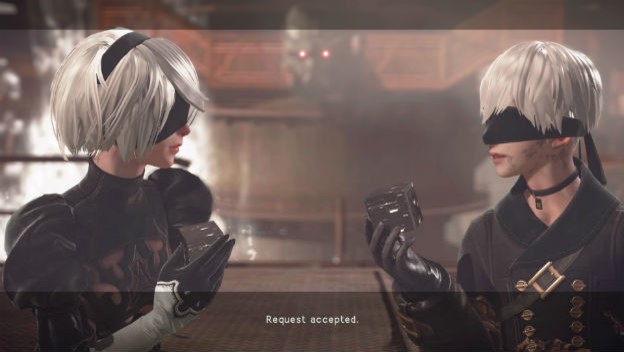Side quests are a means of adding more value to a game’s content, but more often than not I find them to be the bane of my existence. This is almost especially the case in RPGs or open world games where everything amounts to fetch quests and/or beating up several waves of enemies. At this point, side quests risk making a game feel repetitive. What is there to do?
Games are built on set mechanics, so they risk player disengagement. The more engaging these mechanics are, the more they might want to experiment. If side quests are designed to help foster such experimentation, then great. But I think even the games that just throw wave after wave of enemies at you can still generate some rewarding side quests that build upon a game’s world. How? By telling engaging stories.
I noted in my review of NieR: Automata that most of the side quests are fetch quests, and they do feel like a pain. However, the game knows this. It is aware of the pointlessness in such activities, and the clients often said things after each completed mission that startled me. More often than not, I found myself sympathizing with clients, such as a robot outside the castle gates or a couple trying to escape from the battlefield.
By contrast, I felt no connection with any of the quest givers in inFamous . Each client merely told me to do this or that. As a result, I had an easier time distinguishing the few mission types that the game had to offer. Granted, you could find collectibles that filled you in on missing details. Some games don’t even bother with this. They’re egregious, yet I can’t help myself because collecting these things fulfills the bargain necessary for obtaining some gaudy trophy.
I may have mentioned NieR: Automata earlier, but I don’t even think it’s my best example of side quests done right. I’ve been replaying The Legend of Zelda: Majora’s Mask and I’m enthralled with its side quests. You have three days to save the world, but all of Termina’s inhabitants have issues holding them back from living their lives to the fullest. Almost everything resets if you turn back time, so good luck memorizing every character’s schedule and solving their problems just before you fight the final boss. It’s almost enough to make me forget I’m basically solving the same puzzles over and over again.

Yakuza 0 is another great example. It offers a ton of minigames that allow you to literally enjoy a night on the town, but these weren’t even my favorite parts of the game. Instead, I was drawn towards its batshit insane Sub Stories. In the span of an hour, I infiltrated a cult, protected a Michael Jackson-knockoff from the very zombies he hired for a music video, and accidentally introduced the concept of sales tax to 1980’s Japan. (I have no idea how historically accurate this game is.) As bonkers as these stories can be, they also fit the game’s themes. Kiryu and Majima might be tough-as-nails gangsters, but they’re also empathetic, as are all of the quirky characters they encounter.
Games are repetitive beasts by nature, but that’s nothing to be ashamed of. All of the examples I listed vary in engagement mechanically, but they all had character, and it’s all thanks to the stories of the people who inhabit these worlds.
